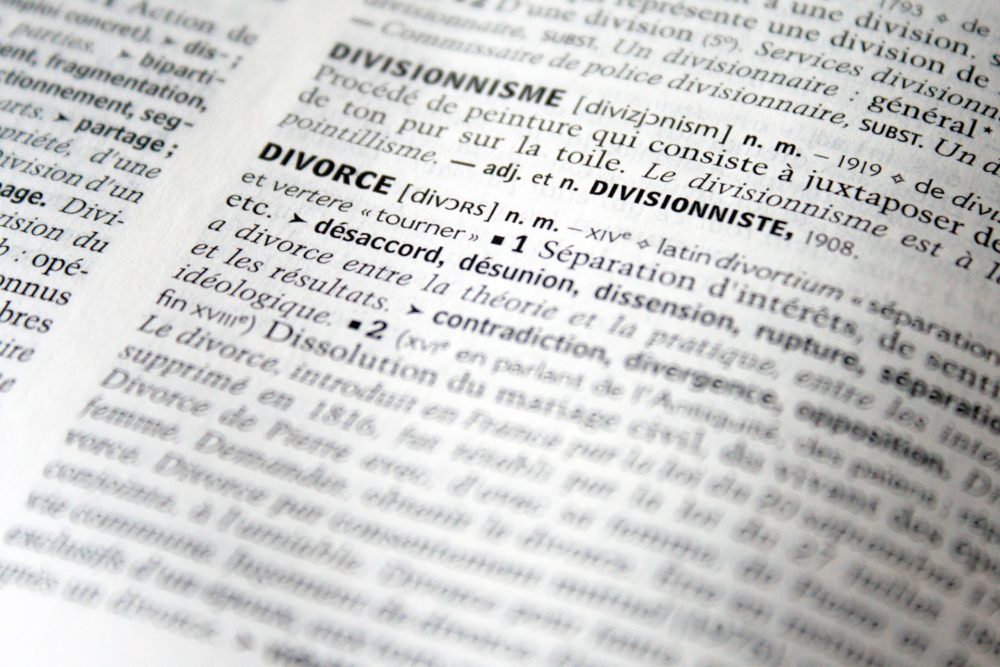When people get married, they never think that such a happy moment in their life could lead to divorce. Going through a divorce is one of the most difficult and trying times a person can experience in their life. When the life that they once knew changes, there are many steps that need to be taken to discover and settle a new future. Continue reading below to learn more about each step of the divorce process in detail and contact an experienced New York divorce attorney for guidance in dealing with these pressing matters.
How do I Prepare for a Divorce?
Due to the fact that divorce is a major step in your life, it is important to be prepared for everything you are about to face to ensure the process goes as smoothly as possible. This can be accomplished by completing the following steps:
- Be sure you are ready. Going through a divorce is not a spontaneous decision. It takes a significant amount of thought and emotional preparation. It is crucial that you do not rush into this process without considering all options first.
- Once you are ready, start by gathering the necessary documents to complete the divorce process. This can include W-2s, bank statements, credit card statements, pay stubs, information regarding any properties, three years of tax returns, retirement assets, stock or investment portfolios, and more.
- Be organized at all times and make sure you have a thorough understanding of your finances. This can be done by creating a financial plan to be aware of how you can support yourself once your divorce is final. This can include determining weekly or monthly bills as well as any foreseeable expenses. With the proper documentation and a financial plan ready, you can proceed with a divorce.
What is the Divorce Process Like?
There are many steps in a divorce that must be completed in order for the process to be final. One of the first steps is to satisfy New York State’s residency requirement and show that you and/or your spouse have lived within the state for at least two years. Once this is done, you can file a Complaint for Divorce in which you must cite grounds. This can include either fault or no-fault grounds for the divorce.
No-fault does not mean you are required to prove the marriage is coming to an end at the fault of your spouse. It only has to be shown in your divorce papers that the marriage has been “irretrievably broken” for a period of at least six months. On the other hand, fault grounds divorces require proving that your spouse took part in one of the following acts:
- Cruel and inhuman treatment
- Abandonment for a period of one year or more
- Imprisonment for three or more years
- Adultery
- Living apart for one or more years after obtaining a judgment of separation
- Living apart for one or more years pursuant to a separation agreement
When the complaint is filed, they can be served to the defendant. This individual can either admit or deny any allegations within the complaint and file a countersuit if they wish to do so. From this step, you can enter the discovery process with your attorney. This is usually the longest part of a divorce, as it requires gathering documents regarding the financial situation of both you and your spouse. This includes net worth statements, marital properties, and more. You can then enter the Compliance Conference, where it will be stated that both parties have everything they need to continue. When the trial begins, the plaintiff can testify, call witnesses, and submit any relevant documentation. It is important to know that the defendant has the same rights and can cross-examine as well. When the entire process is finalized and agreements are made, you may be granted a Judgement of Divorce.
What is the Difference Between a Contested and Uncontested Divorce?
When people go through a divorce in Suffolk County, there are two primary types. This includes a contested divorce and an uncontested divorce. The difference between the two are as follows:
- Contested divorce: You and your spouse are unable to agree to the terms of your divorce and will most likely enter the litigation process.
- Uncontested divorce: You and your spouse are able to agree to the terms of your divorce.
Should I File for Divorce First?
As previously stated, it is important to be prepared for a divorce. If your spouse files for divorce first, you may not have everything you need to proceed. However, if you file first, you will have researched the best attorney for your case, gathered the proper documentation necessary, and created a financial plan for yourself. In addition to this, if you live in Suffolk County and your spouse resides in another state, you may be required to travel to that state in order to carry out the divorce proceedings. By filing first, the process can unfold on your own terms and possibly save you time and money in the long run.
What are Alternative Methods to Divorce?
Due to the fact that divorcing in a courtroom can be a long and difficult process, there are many people looking into alternative methods to avoid litigation. This can include the following:
- Mediation: With the assistance of an unbiased third party, mediation exists to help spouses reach agreements regarding their marital issues through open and honest negotiations. The third party is present to mediate any disagreements that may take place and guide spouses towards solutions in their best interest. This process has no set length and spouses can take the time they need. Once the process concludes, the mediator drafts an agreement to be signed and presented to the court for review. If the court agrees with the arrangements, they may be granted a Judgement of Divorce.
- Collaboration: This exists through a series of four-way meetings. Spouses can communicate with one another with the assistance of their attorneys to settle any disputes regarding their marital issues. This process is supported by a Participation Agreement that is signed by all parties included, detailing their obligations throughout the process. This holds all parties responsible for the success of the process and prevents the attorneys from representing the spouses in court if it does not work out.
- Arbitration: Similar to mediation, this process requires a third party. However, this individual acts as a judge instead of a mediator. They are able to make all final decisions regarding the couple’s marital issues.
How is Property Divided in a Divorce?
When property is divided by a judge during a divorce, it is done based on which assets are marital property and which are separate property. Marital property includes assets acquired during your marriage, such as your home. Separate property includes assets acquired either before marriage or outside of your marriage, such as gifts or inheritance.
It is important to note that New York is an equitable distribution state. While it is a common misconception that this means marital property is divided equally between two spouses, it actually means that the property is divided fairly between you and your spouse. In order to determine what is considered fair, the judge will consider a variety of factors relating to the marriage. This can include the length of the marriage, each spouse’s contribution to debt and assets, the financial situation of each spouse, and more.
What is a High Income Divorce?
If you and your spouse have combined money and assets that are valued at more than $1 million, you are entering a high income divorce. While this process is generally similar to a “regular” divorce, it can often become more financially complicated. The more assets, stocks, properties, debts, and high profile possessions you have in your relationship, the more complex the divorce can become. If either you or your spouse has your own business, this can come into play as well. In the event that you do not have a prenuptial agreement or cannot reach an agreement with your spouse regarding how these should be divided, the court will also follow the method of equitable distribution to do so.
How Can a Prenuptial Agreement Protect my Assets?
In order to protect your assets in the event of a divorce, you can sign a prenuptial agreement. It is important to know that this must be drafted and signed before the marriage is official. Simply put, a prenuptial agreement is a document that outlines how you wish your assets to be divided in the event of a divorce so that it avoids the equitable distribution process. The document must be in writing, fair, executed voluntarily by both parties in front of a notary, and include full disclosure at the time of execution.
If you are already married and do not have a prenuptial agreement, it is possible to still draft a postnuptial agreement. These are essentially the same, the only difference is that a postnuptial agreement can be signed after a marriage is official.
How is Alimony Calculated?
Alimony, also referred to as spousal maintenance, are payments made from an independent spouse to a dependent spouse to provide them with financial stability after a divorce. This is because, after a divorce, some spouses are left in unfair financial standings due to the circumstances of their marriage. As every marriage is different from one another, there are different types of alimony that may be ordered. This can include:
- Permanent alimony: This lasts either indefinitely or until there is a change in either party’s circumstances. The length of payment can be based on the duration of the marriage. Marriages that last up to 15 years may see alimony for 15 to 30% of the duration. If the length is between 16 and 20 years, the payments may be between 30 to 50% of the duration. If it lasts 20 years or more, it may be between 35 to 50% of the duration.
- Rehabilitative alimony: Spouses who hold off their own careers to support their family may be awarded alimony so that they can receive the education or training they need to get back into their field.
- Reimbursement alimony: If one spouse supports their partner financially while they pursue education or training, this alimony can be ordered to reimburse them.
In order to determine the amount that is owed in alimony, courts will analyze a variety of factors relating to your marriage. This can include both you and your spouse’s income, tax consequences, and marital property. Generally, the longer the marriage, the longer the duration of alimony will be.
What do I Need to Know About Child Custody?
Determining child custody is one of the most contested issues in a divorce, as neither parent usually wants to live without their child. In the state of New York, there are two primary types of child custody: joint and sole custody. When parents share custody of their child, it is known as joint custody. If only one parent has custody of their child, it is known as sole custody. Custody can be further broken down to two more categories: physical and legal custody. Physical custody refers to the parent the child lives and spends the majority of their time with. On the other hand, legal custody allows a parent the right to be involved in making important decisions regarding the upbringing of their child. This can include religious practices, education, medical treatment, and more.
In order for a judge to determine the right custody situation for a child, they will consider a variety of factors, such as:
- Your child’s age
- Which parent has been the primary caregiver throughout their life thus far
- The quality of each parent’s homes
- If it is safe for the child to stay with the primary caregiver
- The preference of the child if they are of a certain age and maturity to decide
What do I Need to Know About Child Support?
When a child lives with one parent, that individual takes on the child’s cost of living. However, the state of New York requires both parents to financially support their child until a certain age. It is because of this that child support payments are made from one spouse to another to balance out the child’s cost of living. The New York Child Support Standards Act (CSSA) determines the amount that is owed in child support based on the combined income of both parents, up to $148,000, and allocates the support in proportion to this income. The percentage of their income that a parent can owe depends on how many children they have. This is as follows:
- One child: 17%
- Two children: 25%
- Three children: 29%
- Four children: 31%
- Five or more children: No less than 35%
Generally speaking, courts in Suffolk County require child support to be paid until the child reaches the age of emancipation. In New York, this age is usually 21 years old. However, the courts also recognize that every family situation is different. It is because of this that they will consider a variety of factors before determining that the payments should be terminated. In the event that your child has special needs or wishes to pursue higher education, child support may be extended past 21 years old. Alternatively, if it can be proven that your child can support themselves before they reach the age of emancipation, courts may grant an early termination.
Can Divorce Settlements be Changed Over Time?
As life goes on after a divorce, you and your former spouse can experience a variety of changes in your life. The court understands that this happens. It is because of this that months or even years after a divorce, settlement agreements can be modified in order to reflect the changes in your life. It is important to note, in order to be granted a post-judgment modification, it must be proven that the change was unforeseen, significant, and ongoing.
Contact our Firm
Matters of divorce and family law should be navigated with the guidance of an experienced attorney. If you need strong legal representation regarding matters of divorce, family law, and estate law, contact the Law Offices of Susan A. Kassel, P.C. to schedule a consultation today.




